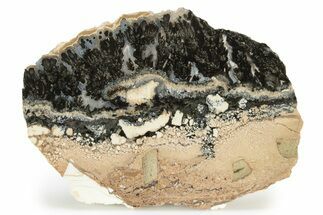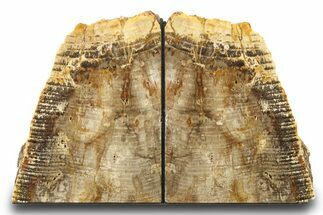This Specimen has been sold.
3.7" Polished Petrified Wood Limb Cast - Oregon
This is a 3.7" wide, banded agate limb cast of petrified wood that was collected from Crooked River in Oregon. The agate has gorgeous bands of white and colorless agate that replaced the petrified wood, with the center of the specimen featuring water line agate and a druzy quartz encrusted pocket on the opposite end. Both ends have been cut flat and polished to a glossy finish.
About Agate
Agate is a variety of microcrystalline quartz (chalcedony) that displays translucence and, in some cases, banding. Agate primarily forms when silica-rich fluids fill pockets within rocks and/or fossils, depositing the silica along the walls of the rock. This process can result in banding patterns, as the compositions and impurities of these depositing fluids change over time. These banding patterns can either form as flat layers, creating linear patterns known as waterline agate, or as rounded layers, forming more common ring-like patterns. These patterns depend on the surfaces available for deposition.
Agate is a variety of microcrystalline quartz (chalcedony) that displays translucence and, in some cases, banding. Agate primarily forms when silica-rich fluids fill pockets within rocks and/or fossils, depositing the silica along the walls of the rock. This process can result in banding patterns, as the compositions and impurities of these depositing fluids change over time. These banding patterns can either form as flat layers, creating linear patterns known as waterline agate, or as rounded layers, forming more common ring-like patterns. These patterns depend on the surfaces available for deposition.
What Is Petrified Wood
Petrified wood is the name given to wood that has been turned into stone (fossilized) through the process of permineralization. In this process, all of the organic matter becomes replaced by minerals, while much of the original structure, such as tree rings, is retained. For this to happen, the wood needs to be buried in an environment low in oxygen to prevent decomposition and with flowing, mineral-laden water, so minerals may replace structures. The coloration is caused by various minerals that present in that water during fossilization. For example, red colors are due to iron compounds, greens due to copper, and so on.
Petrified wood is the name given to wood that has been turned into stone (fossilized) through the process of permineralization. In this process, all of the organic matter becomes replaced by minerals, while much of the original structure, such as tree rings, is retained. For this to happen, the wood needs to be buried in an environment low in oxygen to prevent decomposition and with flowing, mineral-laden water, so minerals may replace structures. The coloration is caused by various minerals that present in that water during fossilization. For example, red colors are due to iron compounds, greens due to copper, and so on.
SPECIES
Chalcedony var. Agate
LOCATION
Crooked River, Oregon
SIZE
3.7 x 3.4 x 3.3"
CATEGORY
ITEM
#248628
 Reviews
Reviews














